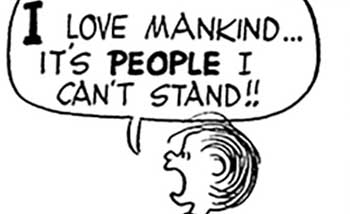Liturgy: “Stuff God can use: fear, guilt, insecurity, and laziness”
God has shown me, in the years since, some of the depths of my brokenness. Every attempt to be good, to follow God’s law, has shown me how much more deeply I need to be changed.

What is the King’s Liturgy? King’s Liturgy defines our experience together as a Christian community. It outlines the rhythms we celebrate with the Church at large: Scripture readings, Sabbath habits, and celebration of Holy Days and historical events.
This Week’s Lectionary Readings
Ruth 1:1-18
Psalm 146
Hebrews 9:11-14
Mark 12:28-34
This week’s liturgy is contributed by Dr. Phil Williams, associate professor of mathematics:
Perhaps this will sound silly, but when I first became a Christian, I expected that I’d be able to simply love the people around me. I expected that I’d just be able to start doing that. I thought it would be easy. I think I was really captivated by the idea of giving everything up for God, loving him above all else, and living a sacrificial life in which I obeyed God and served others. This inspired me. When I would read “the greatest commandment,” talked about in the scriptures, I’d feel great joy, and inspired to serve. It seemed so exciting, deciding to be a person that would follow God. I’d go around loving people, and they would be drawn towards Jesus. Life seemed full of promise.
Before I became a Christian, I can’t really say that I lived by any particular sort of moral code. I didn’t grow up in the church, and thus I had no expectations about what being a Christian would be like. When I became a Christian, the decision to start to love and serve God was, for me, only comparable to other decisions. It was like the decision to exercise more, or to major in math. These were things I had done, successfully, and I thought I could do “the God thing” too. I thought it would be easy to love: love God, love my neighbor. I thought I could decide to do that and everything would be OK. I just had to start.
I remember reflecting on this in a conversation with one of my first Christian friends, telling him how surprised and disappointed I was that I couldn’t just love people. I didn’t know that fear, guilt, insecurity, and laziness would be so powerful. I thought I could just shed these things. Instead, they would loom so large in every attempt I made to be moral. I was naïve; I didn’t know how difficult it is to really change.
God has shown me, in the years since, some of the depths of my brokenness. Every attempt to be good, to follow God’s law, has shown me how much more deeply I need to be changed. God means for this to happen. He gave the Israelites the law—including the “greatest commandment”—and set up the whole sacrificial system for them, partly to prepare them to understand the ultimate sacrifice, the Lamb of God, who takes away the sin of the world. It’s not that the temple sacrifices didn’t matter—it’s not as if God was just showing them something that wouldn’t work. The grace of the cross is already present in these early means of grace: they were a partial grace that prepared the way for the fuller, more complete grace, in the death and resurrection of our Lord. And, in the same way, the grace of God is present even in our earliest, naive attempts to follow after him. We still have to learn just how much it doesn’t depend on us. We still have to learn that our burnt offerings can never erase our sins.
God’s law is not meant to be a burden, but rather a grace and a promise. He shows us that we need him and that he will come through, because “everyone who asks, receives.” The fear we feel initially at the prospect of being told to love God and our neighbor never goes away completely in this life, but as we learn to trust more deeply in God it is accompanied by a deeper and deeper sense of his mercy. Thus I am still thrilled by the greatest commandment, because I’ve come to understand that the commandment is a promise that doesn’t depend on me. You shall love God—it will happen. God has declared that to me. You shall love your neighbor as yourself, even though right now sometimes you can barely stand yourself, let alone your neighbor. He will make it so.




